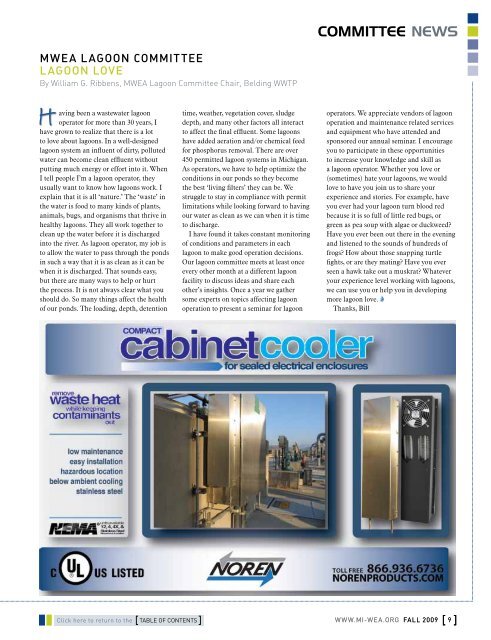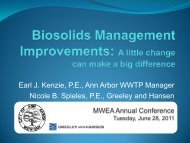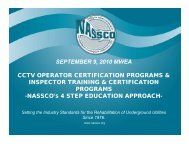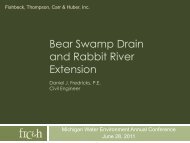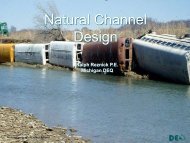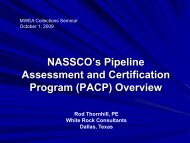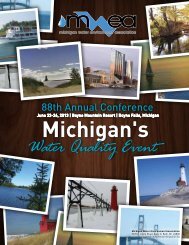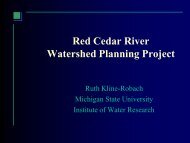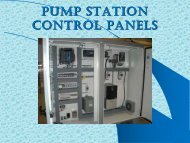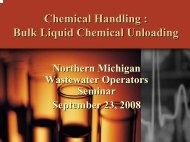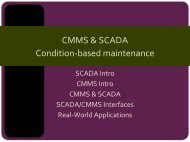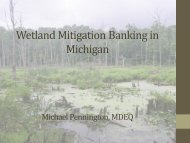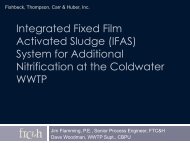Fall 2009 - Michigan Water Environment Association
Fall 2009 - Michigan Water Environment Association
Fall 2009 - Michigan Water Environment Association
Create successful ePaper yourself
Turn your PDF publications into a flip-book with our unique Google optimized e-Paper software.
committee news<br />
MWEA lagoon committee<br />
Lagoon Love<br />
By William G. Ribbens, MWEA Lagoon Committee Chair, Belding WWTP<br />
H<br />
aving been a wastewater lagoon<br />
operator for more than 30 years, I<br />
have grown to realize that there is a lot<br />
to love about lagoons. In a well-designed<br />
lagoon system an influent of dirty, polluted<br />
water can become clean effluent without<br />
putting much energy or effort into it. When<br />
I tell people I’m a lagoon operator, they<br />
usually want to know how lagoons work. I<br />
explain that it is all ‘nature.’ The ‘waste’ in<br />
the water is food to many kinds of plants,<br />
animals, bugs, and organisms that thrive in<br />
healthy lagoons. They all work together to<br />
clean up the water before it is discharged<br />
into the river. As lagoon operator, my job is<br />
to allow the water to pass through the ponds<br />
in such a way that it is as clean as it can be<br />
when it is discharged. That sounds easy,<br />
but there are many ways to help or hurt<br />
the process. It is not always clear what you<br />
should do. So many things affect the health<br />
of our ponds. The loading, depth, detention<br />
time, weather, vegetation cover, sludge<br />
depth, and many other factors all interact<br />
to affect the final effluent. Some lagoons<br />
have added aeration and/or chemical feed<br />
for phosphorus removal. There are over<br />
450 permitted lagoon systems in <strong>Michigan</strong>.<br />
As operators, we have to help optimize the<br />
conditions in our ponds so they become<br />
the best ‘living filters’ they can be. We<br />
struggle to stay in compliance with permit<br />
limitations while looking forward to having<br />
our water as clean as we can when it is time<br />
to discharge.<br />
I have found it takes constant monitoring<br />
of conditions and parameters in each<br />
lagoon to make good operation decisions.<br />
Our lagoon committee meets at least once<br />
every other month at a different lagoon<br />
facility to discuss ideas and share each<br />
other’s insights. Once a year we gather<br />
some experts on topics affecting lagoon<br />
operation to present a seminar for lagoon<br />
operators. We appreciate vendors of lagoon<br />
operation and maintenance related services<br />
and equipment who have attended and<br />
sponsored our annual seminar. I encourage<br />
you to participate in these opportunities<br />
to increase your knowledge and skill as<br />
a lagoon operator. Whether you love or<br />
(sometimes) hate your lagoons, we would<br />
love to have you join us to share your<br />
experience and stories. For example, have<br />
you ever had your lagoon turn blood red<br />
because it is so full of little red bugs, or<br />
green as pea soup with algae or duckweed<br />
Have you ever been out there in the evening<br />
and listened to the sounds of hundreds of<br />
frogs How about those snapping turtle<br />
fights, or are they mating Have you ever<br />
seen a hawk take out a muskrat Whatever<br />
your experience level working with lagoons,<br />
we can use you or help you in developing<br />
more lagoon love.<br />
Thanks, Bill<br />
Click here to return to the<br />
TABLE OF CONTENTS<br />
w w w.mi-wea.org <strong>Fall</strong> <strong>2009</strong> 9


